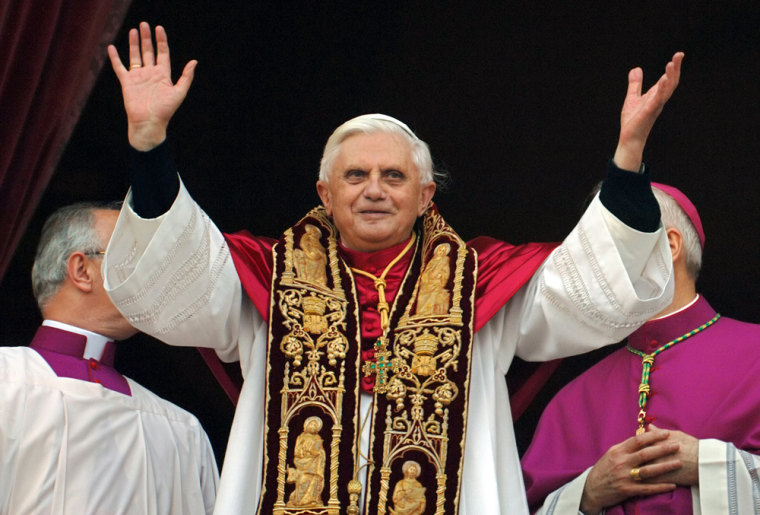For someone who joked that becoming pope was like having a guillotine fall on him, Benedict XVI has plunged enthusiastically into the job, reaching out to other Christians and China while holding fast to church doctrine.
But in his first 100 days, Benedict has also stumbled, offending Israel by neglecting to mention a suicide bombing in a list of countries recently hit by terrorism — an apparent oversight that likely won’t tarnish his otherwise strong record on improving relations with Jews.
The new pope acknowledges that he’s still learning the ropes — and his spokesman asked that he not be judged at the traditional 100-day mark, which arrives Thursday. Popes aren’t elected in four-or-five year terms the way politicians are, he noted.
Yet when asked this week whether the last 100 days had been difficult, Benedict replied: “In a certain sense, yes. I had never thought about (assuming) this ministry. But people have been so good to me and have been supporting me.”
His next 100 days won’t provide any respite. Benedict returns to his native Germany next month for World Youth Day in Cologne. He’ll visit a synagogue and meet with Muslim leaders, and will be closely watched to see if he can connect with young people to the same degree his predecessor Pope John Paul II did.
“No one expects him to be a superstar like JP II, but how well can he communicate with them?” asked the Rev. Thomas J. Reese, the former editor of the Jesuit weekly America magazine.
Donning a different hat
Reese was quite possibly the last cleric to get slapped down by former Cardinal Joseph Ratzinger in his days as guardian of church doctrine: The Jesuit was forced to resign shortly after Ratzinger became pope April 19 because of complaints that his magazine published opinions contrary to church doctrine.
Because of such incidents, many believed that as pope, Benedict would be an authoritarian leader with little flair for the pastoral. But so far he has tried to shed that reputation.
He has signed autographs, delved into church crowds to greet the faithful and joked that he felt like a “guillotine” was falling on him when he realized the votes were going his way during the conclave. He even posed for photos with stunned tourists atop Mont Blanc during a recent impromptu visit during his Alpine vacation.
“I think the Holy Father has really now begun to use a different hat,” said the Rev. Anthony Figueiredo, professor of systematic theology at Seton Hall University in New Jersey. “He’s very aware of that and his position is to be the center of unity.”
Reaching out to China, other Christians
Indeed, unifying Christians and reaching out in particular to the Orthodox seems to be an early hallmark of his papacy. During both his first homily as pope and his first papal trip, Benedict pledged that healing the 1,000-year rift with the Orthodox would be a “primary” commitment of his papacy.
The gestures seem to have been well received: Orthodox leaders confirmed in June that the theological dialogue between the two churches that was interrupted four years ago can resume. They have also invited him to the Church headquarters in Istanbul, Turkey, but the Vatican hasn’t made a decision on the trip.
Benedict seems to have also made some headway with China: Last month, a new auxiliary bishop for Shanghai was consecrated with the tacit approval of the Vatican. Catholic churches in China are run by a government-sanctioned group that recognizes the pope as a spiritual leader but has no formal relations with the Vatican and appoints its own bishops.
As a result, the consecration of a Vatican-approved bishop was seen as something of a breakthrough — even though establishment of diplomatic ties may still be a long way off.
Asked this week about the progress with China, which by some estimates has 12 million Catholics, Benedict replied: “We’re hopeful; we hope the dialogue goes forward.”
Different response
Reese noted that John Paul had reached out to both Orthodox and Chinese during his pontificate. “The difference is that they seem more willing to respond,” he said.
“The Orthodox seem less afraid of a German professor than of a Polish superstar who was appointing bishops in their territories,” he said in an e-mail. “Same with the Chinese. Now that the man who brought down the Soviet Empire is gone, they might be willing to make a deal in order to improve their human rights record.”
Beyond those initiatives, Benedict has highlighted church teachings on several key issues: the church’s opposition to abortion and euthanasia, its belief that abstinence is the only “fail-safe” way to prevent AIDS, and that divorcees who remarry without getting an annulment cannot receive the Eucharist.
That last issue is expected to come up during Benedict’s first major church meeting, a synod of bishops scheduled for October. Also on his agenda is his first encyclical, as well as a long-awaited document on homosexual priests and seminarians.
And then there are the pressing concerns of terrorism, halting the spread of secularism in Europe and reaffirming its Christian roots, and running the vast Vatican bureaucracy which by some reports he may trim in the coming months.
“We have work, a lot of work to do,” papal spokesman Joaquin Navarro-Valls said.
